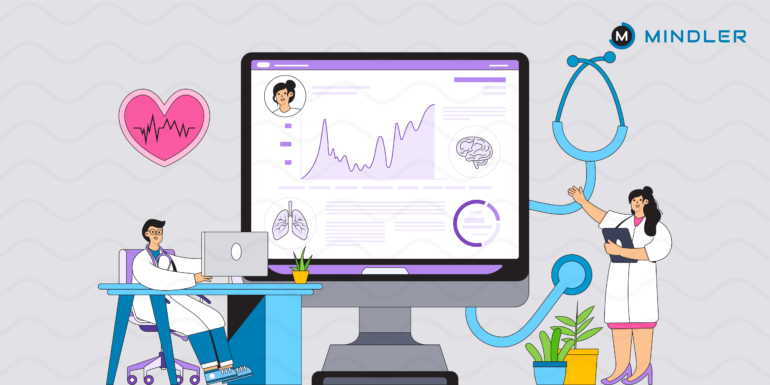Imagine a hospital struggling with rising patient readmissions, mismanaged resources, and delayed treatments. Without Healthcare Data Analysts, critical insights from patient records and workflows remain hidden in unstructured data, leading to missed disease warnings, preventable complications, and financial strain. However, with healthcare data analysts’ expertise, hospitals can streamline operations, enhance patient care, and reduce costs efficiently. If you also aspire to enter this field, continue reading to explore healthcare data analysts essential skills, career scope, and growth opportunities.
What is a Healthcare Data Analyst?
Healthcare data analysts are professionals who analyse complex data. They help organisations improve patient outcomes and operational efficiency by analysing data from various sources, such as electronic health records, insurance claims, and clinical studies.
Skills Required for a Healthcare Data Analyst
Technical and soft skills are essential to thriving as a healthcare data analyst. Those with a good balance of technical and soft skills can easily become successful in healthcare and data analysis. Some key health data analyst skills are mentioned below:
Technical Skills
- Programming languages: Experience with programming languages like Python, R and SQL.
- Analytical techniques: Understanding analysis and mathematical modelling.
- Data visualisation: Experience using data visualisation software such as Tableau or Power BI.
- Database management: Familiarity with handling database systems and advanced data technologies for large-scale datasets.
Soft Skills
- Data interpretation: Utilising skills to make sense of intricate data sets.
- Communication skills: Presenting findings to stakeholders requires communication skills.
- Problem-solving skills: Addressing challenges within healthcare systems requires innovative solutions.
- Time management: Juggling projects effectively requires good time management abilities.
How to Become a Healthcare Data Analyst?
Now, how do you become a healthcare data analyst? Here’s a detailed roadmap to pursue a healthcare data analyst career.
-
Complete Educational Requirements
A bachelor’s degree in computer science, information systems, mathematics, or statistics is often required. Some positions may also require a master’s degree or specialised training in healthcare analytics. Consider enrolling in a specialised healthcare data analyst program, as a degree in healthcare analytics provides a strong foundation for this field.
-
Gain Relevant Experience
Working in healthcare settings can provide valuable insights into industry-specific challenges. Consider internships or entry-level positions related to data analysis or healthcare administration.
-
Obtain Certifications
Earning relevant certifications, such as Certified Health Data Analyst (CHDA) or other recognised credentials, can enhance your qualifications and showcase your expertise in healthcare data analysis. Additionally, a healthcare data analyst degree can provide a strong academic foundation, equipping you with essential skills and industry knowledge.
-
Network and Seek Mentorship
Building connections with professionals in the healthcare analytics field can be incredibly valuable. Seek out mentorship programs or attend networking events tailored to healthcare analytics to gain insights, advice, and potential job opportunities. A strong professional network can open doors and help you navigate your career more effectively.
-
Apply for Jobs
A career as a health data analyst offers the chance to make a meaningful impact across diverse sectors, including hospitals, insurance companies, consulting firms, and government agencies. Begin by exploring job boards and company websites to identify roles aligning with your skills and career aspirations.
Scope for Healthcare Data Analysts
The scope of work for a healthcare data analyst is diverse and can vary significantly based on the organisation they work for. Common responsibilities include:
- Collecting and managing large datasets from multiple sources.
- Analysing trends and patterns to identify areas for improvement.
- Creating reports and visualisations that communicate findings effectively.
- Collaborating with clinical staff to implement data-driven strategies.
Healthcare data analysts may hold various job titles, including health information management analyst, clinical data analyst, or public health data analyst. Their focus may depend on the organisation’s needs, such as improving patient care quality or enhancing operational efficiency. Explore healthcare data analytics programs to stay ahead in the evolving data landscape.
Growth Opportunities
The demand for health data analysts is expected to grow significantly over the next decade. According to projections by the U.S. Bureau of Labor Statistics, jobs in this field are anticipated to increase by 23% from 2023 to 2033. As you advance in your career as a healthcare data analyst, opportunities will arise for higher-level positions, such as senior analyst roles or managerial positions overseeing teams of analysts.
Takeaway
A career as a healthcare data analyst offers immense growth and impact, combining data analytics with healthcare systems to improve patient care and operations. With the rising demand for skilled professionals, staying updated and continuously learning is key. By gaining essential skills through education and experience, you can secure a successful future in this evolving field. Explore Mindler’s blog for deeper insights into building a thriving career as a health data analyst.








